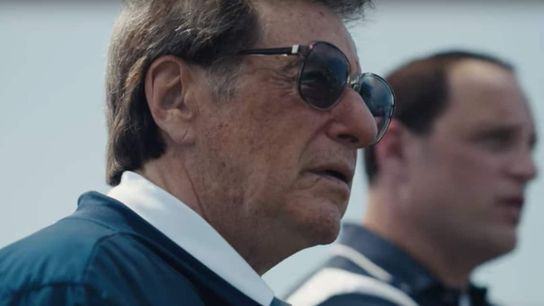There's an exchange at the 89-minute mark of HBO's new Joe Paterno movie that cuts right to the heart of the issue. A child protective services worker meets with Harrisburg Patriot-News reporter Sara Ganim (played by Riley Keough) for an interview:
CPS Worker: He already came forward three years ago, in this office, after his school told him not to report it because Jerry Sandusky had a 'heart of gold.' We contacted the police that day. Usually in cases like this it takes a week, maybe a month to get an arrest. This went for three years, of a scared boy telling a horror story to me, to a trooper, to two other troopers, to two new troopers, a grand jury, then a second grand jury, then a third. Still, no arrest. He suffered from panic attacks, insomnia, conversion syndrome. I don't recall how often or how many times he tried to kill himself. Attorney generals have looked him in the eye, in the eye, saying, 'We're going to arrest this monster next week.' And then more months would go by. And then more months would go by. Three years we stuck with this because we didn't want to see another kid get hurt.
Ganim: What do you think about the Paterno situation?
CPS Worker: I honestly don't know why anybody's talking about Joe Paterno. Somebody six months from retirement didn't see the bigger picture and he failed to vigorously protect children? Of course you goddamn fire him. It's spectacularly unworthy of conversation, I'm sorry. A crime against children happened. Why is anybody talking about Joe Paterno?
And yet the focus in 'Paterno' is on its titular character. The film makes it clear Paterno knew of Jerry Sandusky's crimes well before they went public and failed to stop them. He knew of the infamous 2001 shower incident witnessed by Mike McQueary and did not, as the exasperated father says above, vigorously protect children.
Despite that, 'Paterno' takes a sympathetic view of the former Penn State coach. Played by Al Pacino in a prosthetic nose, Paterno at first just wants to watch tape and coach his team. "I've got Nebraska this week!" he reminds family members as they gather in the Paterno family home to craft his defense. When the scope of the scandal finally dawns on him, literally unfolding on the Paternos' front porch as media members wait in a siege for him to speak, on his front porch, Paterno wants to apologize to the victims and release a statement that defends Penn State as well as his own personal reputation.
Yes, 'Paterno' lays blame for the Sandusky scandal at Paterno's feet. But it also goes out of its way to blame the former Penn State braintrust of president Graham Spanier, vice president Gary Schultz and AD Tim Curley. Numerous flashbacks show Schultz recalling the failed response to the 2001 McQueary report.
At its best, 'Paterno' is a study of how public mythology allows for the institutional failure necessary to let a monster like Sandusky creep about in plain sight. No matter how powerful Paterno may have been, he alone did not fail to stop Sandusky. So did the Penn State brass, the Central Pennsylvania law enforcement system and the culture as a whole, who bought into the media's myth-making of Sandusky as a brilliant tactician who walked away from a rewarding career to save at-risk youth but who, in Paterno's recollection, was really just a creep and an overrated assistant to boot. The Myth of Joe Pa, the movie argues, built a false veneer around the program that Nothing Like That Could Ever Happen Here and when it all came crashing down, students marched on the streets -- not in a righteous anger that Penn State officials knew a serial child rapist was in their midst and failed to stop him, but in defense of Paterno. Now apply this situation and view it through the lens of the Baylor football rape scandal and the ongoing Michigan State gymnastics scandal.
'Paterno' attempts to track the life of the scandal beat-by-beat through the Ganim character, a real-life reporter who now works for CNN. Starting with Penn State's Oct. 29, 2011 game with Illinois -- the game Paterno broke the all-time FBS wins record -- and follows through to his firing 11 days later. But the film then rejects that premise in its final scene, when Ganim takes a call from an adult male coming forward about the time Sandusky molested him and Paterno intimidated the victim into silence -- in 1976. Except that story, which 'Paterno' implies happened in November 2011, actually did not break until 2016.
So, is 'Paterno' worth watching? If you want to put yourself back in that place -- to remind yourself that, yes, one of the biggest child coverup abuse scandals in American history centered around Penn State football and it played out right in front of you -- sure, 'Paterno' is worth your two hours. But if you want to see the point 'Paterno' attempts to make done in much more skillful way -- about how institutions can conspire with each other in allowing monsters to prey upon the weak and the voiceless because doing otherwise would be inconvenient and unprofitable -- watch 'Spotlight,' the Academy Award-winning 2015 film that tracks the Boston Globe's coverage of a similar scandal inside the Catholic Church. And then take a shower afterward.
